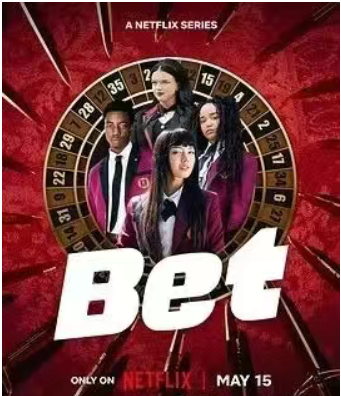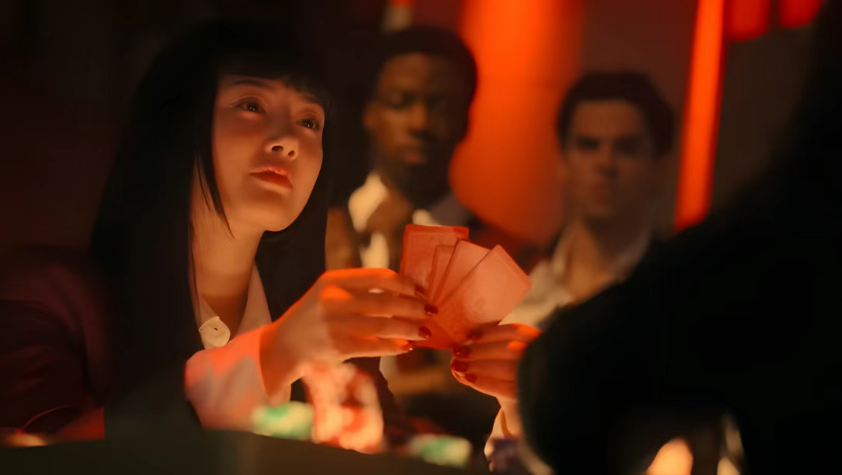**Netflix’s Live-Action "Kakegurui" ("BET") – A Daring Yet Flawed Global Reinvention of Gambling’s Dark Allure**
Netflix’s live-action adaptation of *Kakegurui* (*BET*) reimagines the original’s manic aesthetic through a globalized lens, transforming its high-stakes gambling battles from a Japanese elite academy into a battleground for the world’s ultra-rich. This 10-episode thriller weaves poker, psychological warfare, and capitalist manipulation into a visceral saga of power, revenge, and desire—while sparking fierce debate over its character portrayals and cultural authenticity.
### **1. Visual Spectacle: Gothic Grandeur Meets Cyberpunk Capitalism**
Under showrunner Simon Barry (*Warrior Nun*), the series morphs the original’s "dark academia" into a neon-drenched, cyber-gothic playground. The casino of St. Dominique’s International Academy floats within a glass dome above the clouds, its poker tables etched with circuitry-like engravings under pulsating holograms. Student uniforms fuse cultural signifiers—Chinese frog buttons, Indian zardozi embroidery, Scottish tartan—into a visual metaphor for globalized oligarchy.

**Key Symbolism:**
- **The Mechanical Butterfly:** A recurring motif, this delicate yet artificial creature adorns protagonist Mary’s (Miku Martineau) pocket watch, embodying the chaos of gambling. Its shattering wings signal psychological breaking points.
- **Chip-Embedded Badges:** Students’ rank is displayed via LED-lit insignias that glow red for "livestock" (debt-slaves), mirroring real-world credit-score dystopias.
**Cinematic Gambling:**
Slow-motion close-ups of dilated pupils reveal micro-expressions during bluffs, while CGI-enhanced card throws and exploding chips turn poker into kinetic violence. Yet some fans argue the Hollywood-style spectacle sacrifices the original’s claustrophobic tension.
### **2. Character Overhauls: From "Gambling Addicts" to "Corporate Avengers"**
Netflix’s reinterpretations have polarized audiences:
- **Mary Saotome (Miku Martineau):**
- *Backstory Expansion:* No longer just a thrill-seeker, she’s reframed as a vengeance-driven heir whose parents—Interpol agents—were killed investigating the academy’s shadowy financiers.
- *Performance Debate:* Martineau’s exaggerated "gambling face" leans into horror-movie grotesquery (think *Joker*-esque grins), a stark contrast to the anime’s balletic madness.

- **The Student Council:**
- *Rex (Ayo Solanke):* A Nigerian oil scion who weaponizes debt to control rivals’ family empires.
- *Kira (Clara Alexandrova):* A Russian oligarch’s daughter using seduction and crypto-cheating.
- *Dorian (Hunter Cardinal):* A gender-swapped, flamboyant version of Yumemi, whose drag persona disrupts opponents—a controversial but narratively bold choice.
- **Newcomer Riri (Anwen O’Driscoll):** A Chinese-Irish hacker whose algorithms clash with Mary’s intuition, symbolizing the old-world vs. digital-age gambling divide.

### **3. High-Stakes Gambling: From Mind Games to Economic Warfare**
The series elevates bets into geopolitical metaphors:
- **"Pyramid Scheme" Poker:** Players trade shares of their family corporations using cryptocurrency leverage, exposing Wall Street-style exploitation.
- **"Hunger Games" Roulette:** Losers forfeit meals in a *Squid Game*-esque survival twist, merging financial and bodily deprivation.
- **"Cultural Collateral" Blackjack:** Racially charged wagers force players to stake national attire (e.g., kimono vs. tuxedo), critiquing identity commodification.
Yet the reliance on tech gimmicks (AI prediction, blockchain hacks) sometimes overshadows the original’s pure psychological duels.
### **4. Cultural Adaptation Hits & Misses**
**Successes:**
- **Globalized Critique:** The academy now mirrors real-world elite institutions where grades = financial credit, skewering neoliberal education.
- **Visual Innovation:** A "submarine baccarat" sequence—with players in cracking diving suits—replaces the anime’s Russian roulette with visceral claustrophobia.
**Controversies:**
- **"Americanized" Tone:** The loss of Japanese *bakamono* (eccentric) humor leaves the drama feeling self-serious.
- **Political Correctness Backlash:** Dorian’s gender fluidity and Mary’s trauma-heavy arc are accused of diluting the source material’s anarchic spirit.
### **5. Thematic Depth: Gambling as a Mirror of Late-Stage Capitalism**
The show’s smartest departure is framing gambling as a microcosm of systemic oppression:
- **Debt = Modern Feudalism:** The "livestock" system reflects real-world student-loan traps.
- **Performative Identity:** Characters shift between personas (gambler, heir, revolutionary), questioning authenticity in a profit-driven world.
- **Circular Vengeance:** Mary’s quest to dismantle the academy inadvertently reinforces its power dynamics—a sharp commentary on activist co-optation.
### **Final Verdict: A Lavish But Uneven Bet**
Netflix’s *Kakegurui* is a visually stunning, thematically ambitious remake that stumbles in balancing its Japanese roots with Western sensibilities. While its critique of global elitism resonates, purists may miss the original’s unhinged joy in gambling for gambling’s sake. As the series itself posits: *"The highest stake isn’t money—it’s the lie you call your self."* This adaptation, for all its flaws, dares to gamble with identity itself.
**For Fans Of:**
- *Squid Game* (economic survival horror)
- *Liar Game* (cerebral gambling)
- *Animal World* (Chinese *Kaiji*-inspired thriller)